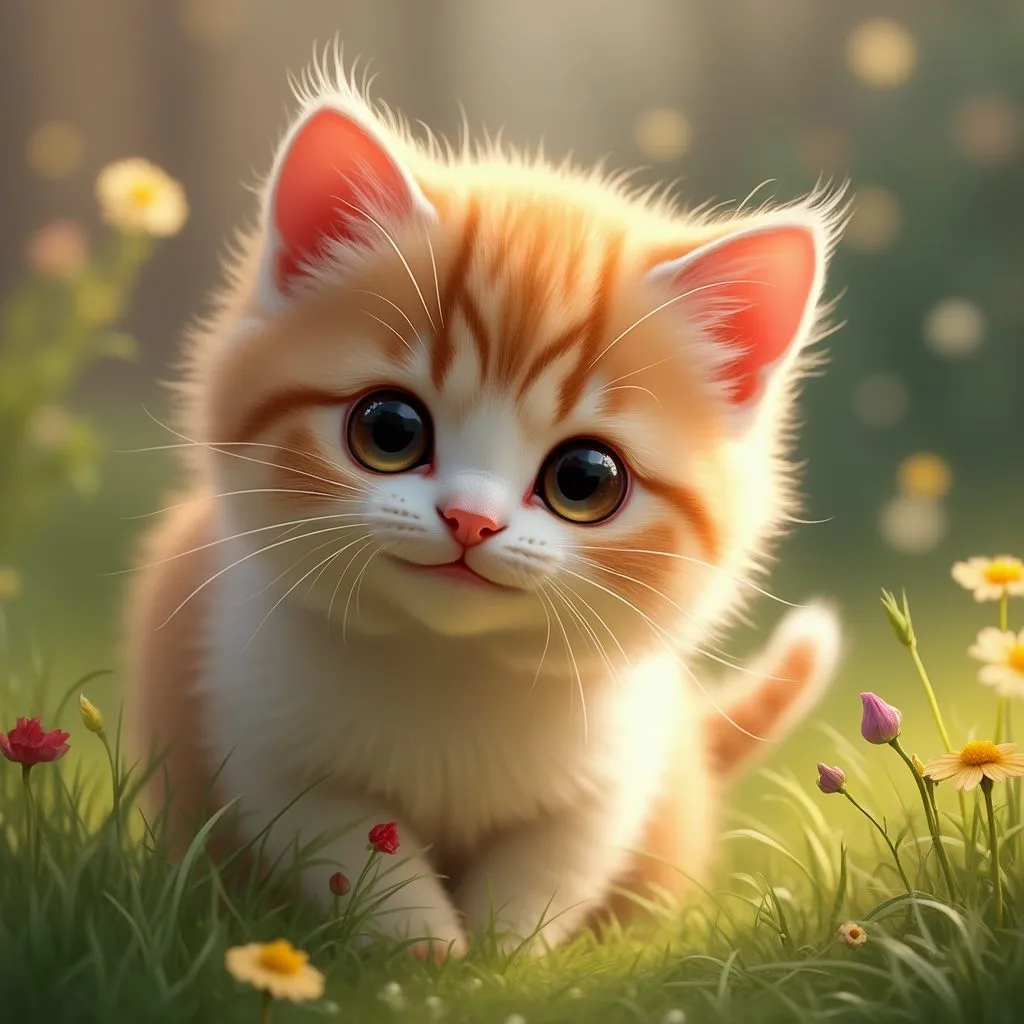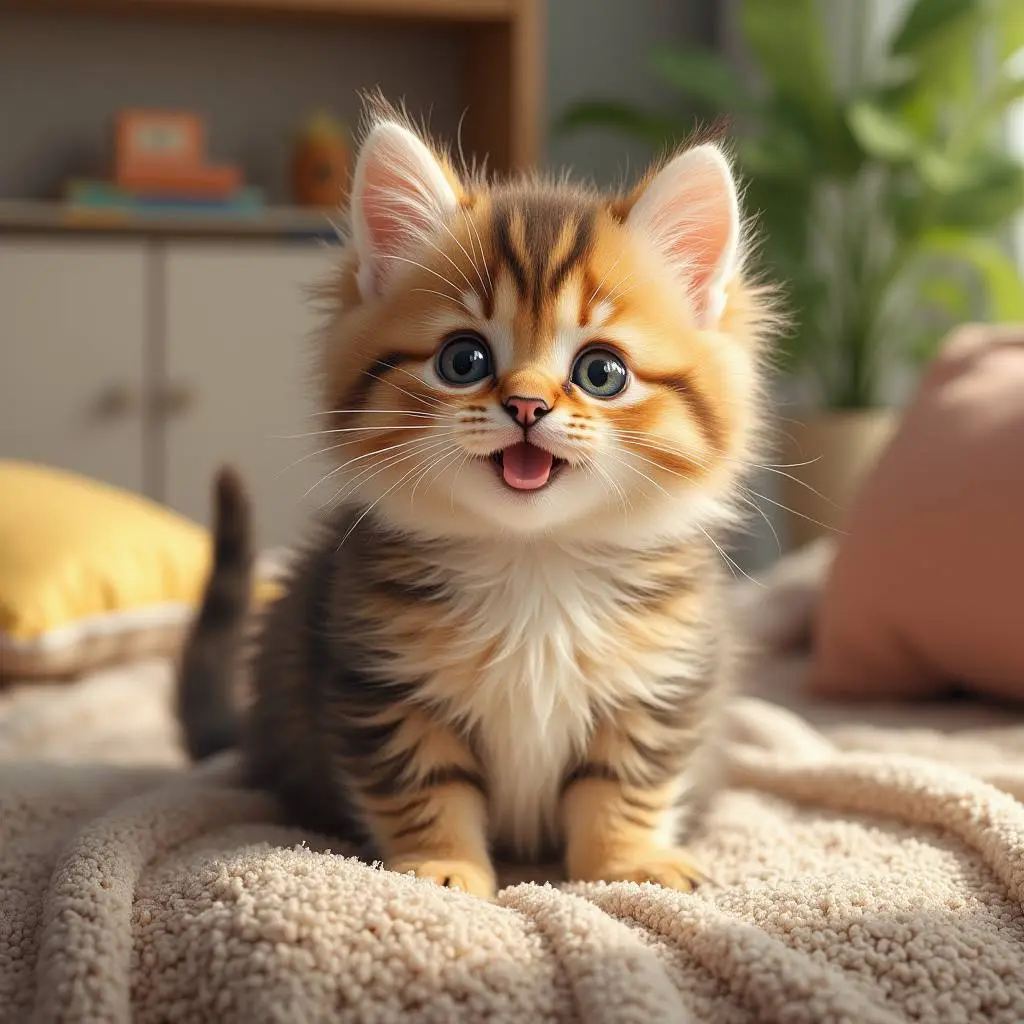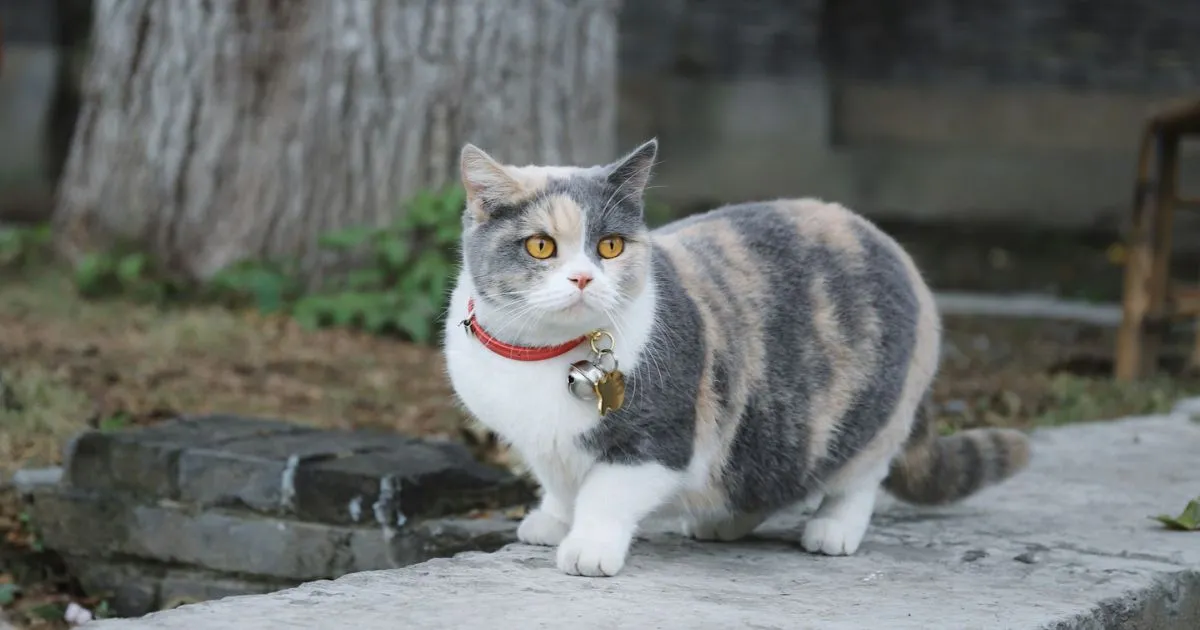Munchkin Cat Lifespan is a topic of interest for anyone captivated by these charming, short-legged felines. Known for their playful personalities and unique appearance, Munchkin cats bring joy to countless homes. But how long can you expect these adorable companions to be part of your life? In this article, we’ll explore the average lifespan of a Munchkin cats, the factors that influence their longevity, and tips to help keep your furry friend healthy and happy for as many years as possible.
Table of Contents
Key Takeaways
- Munchkin cats live about 12-15 years with the right care.
- Their genes and body shape can affect their health and life span.
- Good food, exercise, and a safe place to live are key to their health.
- Knowing about Munchkin cat health problems and regular vet visits are important for a long life.
- Getting a Munchkin cat from a good breeder and following their care tips can help them live a long, happy life.
Understanding the Unique Munchkin Cat Breed
The unique Munchkin cat breed is distinguished by its small legs. They have an intriguing past and a distinctive appearance. Numerous pet owners have fallen in love with these kitties. Let’s explore their physical traits, history, and genetics.
Physical Characteristics of Munchkin Cats
The short legs of Munchkin cats make them unique. This trait comes from a genetic change. Despite their small size, they are very agile and playful.
They love to climb and chase toys. Their short legs add to their charm.
Origin and History of the Breed
The Munchkin cat breed is relatively new. The first Munchkin cat was found in the 1980s in Louisiana. The International Cat Association (TICA) recognized them in 1995.
There’s debate about where they came from. Some think the short legs have been in cats for a long time.
Genetic Makeup and Health Implications
The short legs of Munchkin cats come from a genetic change. This trait is appealing but can lead to health issues. They might face spinal problems, arthritis, and other skeletal issues.
Responsible breeders check the genetics of Munchkin cats. They do this to ensure the cats’ health and happiness.
| Characteristic | Description |
| Body Type | Compact, with a rounded appearance and short, stubby legs |
| Coat | Variety of lengths and textures, including short, medium, and long-haired |
| Eye Color | Ranging from blue to gold, with some Munchkins having odd-colored eyes |
| Size | Typically smaller than average, with a weight range of 4-9 pounds |
Knowing about Munchkin cats’ traits, origins, and genetics helps pet owners. It ensures they make the right choice for their families. It also helps in caring for these cats’ health and happiness.
Average Munchkin Cat Lifespan: Facts and Figures
Understanding the life expectancy of munchkin cats is key for those thinking of getting one. These cats, with their cute short legs, live longer than you might think.
how long do munchkin cats live?
Studies show Munchkin cats live between 12 to 15 years. This is similar to many other domestic cat breeds. Their long life shows they are healthy and adaptable.
For comparison, Domestic Shorthairs live 12 to 18 years. Munchkins might live a bit less, but they still live a long time.
| Cat Breed | Average Lifespan |
| Munchkin Cat | 12-15 years |
| Domestic Shorthair | 12-18 years |
| Maine Coon | 10-15 years |
| Siamese | 15-20 years |
The Munchkin cat’s long life comes from their genes, good care, and no health problems from their short legs. With the right home and care, Munchkin cats can live long, happy lives with their owners.
Factors Affecting Your Munchkin Cat’s Longevity
As a devoted Munchkin cat parent, you want your cat to live a long, healthy life. The Munchkin breed is generally robust, but several factors can affect their longevity. Understanding these elements and taking proactive steps can significantly contribute to your Munchkin’s well-being and lifespan.
Diet and Nutrition Requirements
Proper nutrition is essential for Munchkin cats. It supports their unique physiology and overall health. Choose a high-quality, feline-specific diet that is rich in protein and low in carbohydrates. It should be tailored to your cat’s age and activity level.
Don’t give your Munchkin cat human food or leftover table scraps. These may cause health issues by upsetting their sensitive digestive system.
Exercise and Activity Levels
Even with their short stature, Munchkin cats are energetic and quick. Ensure your feline friend gets regular exercise and mental stimulation. This maintains their physical and emotional well-being.
Provide a variety of interactive toys, scratching posts, and opportunities for playtime. This keeps your Munchkin engaged and healthy.
Environmental Factors
The environment in which your Munchkin cat lives can also impact their longevity. Provide a safe, enriching, and low-stress indoor environment. Ensure access to clean litter boxes, comfortable resting areas, and minimal exposure to toxins or hazards.
Regular veterinary check-ups and preventive care can also help mitigate environmental risks. This promotes your Munchkin’s overall feline health.
By addressing these key factors, you can help ensure your Munchkin cat lives a long, fulfilling life. Remember, every Munchkin is unique. Work closely with your veterinarian to develop a customized care plan that caters to your individual cat’s needs.
Common Health Issues in Munchkin Cats


Munchkin cats have short legs and a unique look. They might face health issues because of their genes. Knowing about these Munchkin cat health problems is key for pet owners to keep their cats healthy.
Achondroplasia is a genetic condition that causes their short limbs. This trait is cute but can lead to joint and spine problems. Issues like intervertebral disc disease and arthritis can cause pain and make it hard for your Munchkin to move.
- Respiratory problems: Munchkin cats might have breathing issues because of their short faces.
- Dental problems: Their teeth often get crowded, which raises the risk of dental disease. Regular dental care is needed.
- Skin conditions: Some Munchkin cats might get skin allergies or infections. They need careful vet care and treatment.
It’s important to catch health problems early and prevent them. Regular vet visits, a good diet, and a fun environment can help. This way, your Munchkin cat can live a long, happy life.
| Common Health Concerns in Munchkin Cats | Potential Causes | Recommended Care |
| Intervertebral Disc Disease | Genetic predisposition due to achondroplasia | Regular veterinary check-ups, weight management, physical therapy |
| Respiratory Issues | Shortened facial features | Monitoring breathing, avoiding extreme temperatures, minimizing stress |
| Dental Problems | Overcrowding of teeth | Routine dental cleanings, dental-friendly diet, regular tooth brushing |
| Skin Conditions | Genetic predisposition, environmental factors | Allergy testing, appropriate diet and grooming, veterinary treatment |
By acting early and tackling these feline diseases and Munchkin cat health problems, you can make sure your Munchkin cat has a long, happy, and healthy life.
Proper Care Tips for Munchkin Cats
Owning a Munchkin tuxedo cat or an orange Munchkin cat needs special care. You must pay attention to their grooming and health. Here are the essential tips to care for your cat well.
Grooming Requirements
Munchkin cats need special grooming. Brush it once a week to remove loose hair and prevent shedding. Trimming their nails every 2-3 weeks keeps their paws healthy and prevents damage.
Bathing should be done when needed. Use a gentle, cat-safe shampoo to keep their coats soft and shiny.
Veterinary Care Schedule
Regular vet visits are key to Munchkin cat care. Annual exams and vaccinations keep them healthy. Watch for any signs of illness or injury and seek vet help quickly if needed.
Living Space Adaptations
Make your home safe and comfortable for your Munchkin cat. Use low-lying furniture and platforms for easy access. Install ramps or steps for higher areas.
Ensure they have enough space to move and explore safely. This prevents injuries.
| Grooming Tip | Frequency |
| Brushing | At least once a week |
| Nail Trimming | Every 2-3 weeks |
| Bathing | As needed, using a gentle, cat-safe shampoo |
Follow these tips to keep your Munchkin cat happy and healthy. A safe home, frequent veterinary checkups, and regular grooming are essential. This ensures your Munchkin tuxedo or orange Munchkin cat lives a great life.
Popular Munchkin Cat Variations and Their Health Profiles
The Munchkin cat breeds come in many variations, each with its own traits and health issues. The Munchkin Ragdoll cat is a favorite, mixing the Munchkin’s short legs with the Ragdoll’s love for people. These cats are big, fluffy, and very friendly. But, they might face health problems because of their mixed genes.
The Tuxedo Munchkin is another well-known type, known for its black and white coat. Like other Munchkins, they have big eyes and a playful spirit. But, they might be more likely to get heart disease. To monitor their health, it’s crucial to take them to the veterinarian frequently.
| Munchkin Cat Variation | Potential Health Concerns |
| Munchkin Ragdoll cat | Mixed-breed genetics, joint issues, respiratory problems |
| Tuxedo Munchkin | Hypertrophic cardiomyopathy, joint problems |
Every Munchkin cat needs a vet to stay healthy. Knowing about the health risks of different Munchkin types helps you care for your cat better. This way, you can give your pet the best life possible.
Nutrition Guidelines for Extended Munchkin Cat Life
Keeping your Munchkin cat healthy means a good Munchkin cat diet and feline nutrition. It’s important to know what food is best and how often to feed them. We’ll look at the key nutrition tips to help your Munchkin cat live longer.
Recommended Food Types
Munchkin cats need a diet full of animal proteins, healthy fats, and vitamins. Choose cat food made for Munchkin breeds or small cats. These foods are made to fit your Munchkin’s special needs.
Feeding Schedule and Portions
- Feed your Munchkin cat many small meals a day, not big ones.
- Change the food amount based on their age, how active they are, and their weight. Keep them at a healthy weight.
- Ensure they always have access to fresh, clean drinking water.
Supplements and Special Dietary Needs
Talk to your vet about supplements or special diets for your Munchkin cat. They might need extra help for their joints, bones, or kidneys. This is common in Munchkin cats.
” A nutritious, high-quality diet is essential for a Munchkin cat’s long life and overall well-being.”
By following these tips and talking to your vet, you can make sure your Munchkin cat lives a long, happy life.
Exercise and Mental Stimulation Needs
As a Munchkin kitten or cat owner, it’s key to give them lots of exercise and mental play. These little cats have lots of energy and curiosity. They need regular ways to use it.
It’s important for Munchkin cats to stay active, no matter their age. Kittens need lots of play to grow strong and coordinated. Play games like chasing feather toys or strings. Always watch them to keep them safe and avoid hurting their special bones.
- Incorporate 10-15 minutes of active play several times a day for Munchkin kittens.
- Provide a variety of toys that stimulate their natural hunting and pouncing instincts.
- To keep them interested and avoid boredom, rotate the toys.
As Munchkin cats get older, they still need to stay active to stay healthy. Provide them with climbing surfaces, such as shelves or cat trees. Also, try puzzle toys and food-dispensing toys to keep their minds sharp.
“Keeping a Munchkin cat mentally and physically engaged is essential for their overall well-being and longevity.”
By focusing on both physical and mental play, you can make your Munchkin cat’s life better. Also, it will enhance your relationship with them.
Signs of Aging in Munchkin Cats
As your Senior Munchkin cat gets older, it’s key to know the signs of feline aging. With the right care, you can help them live a happy life in their golden years.
One early sign is a drop in energy. Your cat might sleep more and play less. This is normal, but you should adjust their activities.
- Reduced mobility and flexibility due to joint stiffness or arthritis
- Decreased vision and hearing, making them more prone to startling or disorientation
- Changes in coat texture and grooming habits, leading to a rougher, matted appearance
- Shifts in sleep-wake cycles, with more daytime napping and nighttime activity
- Increased sensitivity to temperature changes and a need for more comfortable resting spots
To support your Senior Munchkin cat, offer cozy spots to rest, toys made for seniors, and a diet that suits their age. Regular vet visits are also vital to catch and manage health issues. With some extra care, your cat can enjoy their later years fully.
Conclusion for Munchkin cat lifespan
The Munchkin cat lifespan is quite interesting. With the right care, their lifespan can extend up to 15 years. Diet, exercise, and their environment play big roles in how long they live.
To help your Munchkin cat live a long, happy life, feed them well and play with them often. Keep their home safe and clean. Also, don’t forget to take them to the vet regularly. This helps catch health problems early.
By focusing on your Munchkin cat’s health and happiness, you can make their life better. Also, it will improve your connection with them. With the right care, your Munchkin will be a joy to your family for many years.
FAQ
What is the typical lifespan of a Munchkin cat?
Munchkin cats live about 8-13 years, similar to other cats. Munchkin cat lifespan can change based on genetics, diet, exercise, and care.
Are Munchkin cats prone to any health issues?
Munchkin cats are usually healthy but might face spinal, joint, and breathing problems. Regular veterinary check-ups and care are crucial for addressing these issues.
How can I guarantee a long and healthy life for my Munchkin cat?
Feed your Munchkin cat well, keep them active, and give them a safe home. Regular vet visits and preventive care also help.
What are the common health concerns for Munchkin cats?
Munchkin cats might get spinal, joint, and breathing problems. Early vet check-ups can help manage these issues.
How much exercise do Munchkin cats need?
Munchkin cats need regular play and mental stimulation. Toys, scratching posts, and playtime help keep them healthy and happy.
Are there any specific dietary requirements for Munchkin cats?
Munchkin cats require a balanced diet to maintain a healthy weight, as this helps reduce the risk of joint and spinal issues.
How do I groom a Munchkin cat?
Brush your Munchkin cat often to keep their coat healthy. Trimming nails and cleaning ears also helps their comfort and health.
Are there any specific living space considerations for Munchkin cats?
Munchkin cats need a safe, adapted living space. Low-entry litter boxes and easy-access scratching posts are important for their comfort.
What are the different Munchkin cat variations and their health profiles?
Munchkin cats come in many patterns and colors, like the Scottish Fold Munchkin. Each variation might have unique health needs based on their genetics and looks.
How can I tell if my Munchkin cat is entering their senior years?
Senior Munchkin cats may move less, groom less, sleep more, and have less energy. Watching for these signs and talking to your vet can help.

